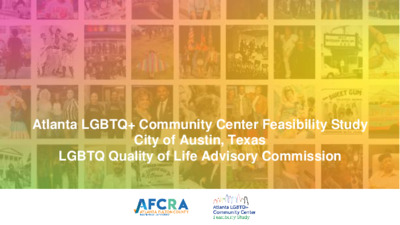Item 2: AFCRA Slide Deck — original pdf
Backup

Atlanta LGBTQ+ Community Center Feasibility Study City of Austin, Texas LGBTQ Quality of Life Advisory Commission Background In November 2024, Atlanta Mayor Andre Dickens and the City Council commissioned a one-year feasibility study to explore the vision, impact, potential, and sustainability of a dedicated LGBTQ+ Community Center in Atlanta. The study is being conducted by the Atlanta Fulton County Recreation Authority (AFCRA)—the city’s public authority for sports and recreation—best known for owning major venues like State Farm Arena (home to the NBA’s Atlanta Hawks and a premier concert venue) and Zoo Atlanta. AFCRA appointed longtime LGBTQ+ advocate and former Atlanta Director of LGBTQ Affairs Malik Brown to oversee the study’s day-to-day operations in collaboration with a large, diverse exploratory committee. Findings will be submitted to the City of Atlanta in December 2025, at which point the City will decide whether to allocate funding and resources to move the project forward. Atlanta is the largest metro in America without an LGBTQ+ Community Center. 1. New York City, NY (20,912,953): The Lesbian, Gay, Bisexual & Transgender Community Center 2. Los Angeles, CA (17,671,828): Los Angeles LGBT Center 3. Chicago, IL (9,408,576): Center on Halsted 4. Dallas-Fort Worth, TX (8,344,032): Resource Center 5. Houston, TX (7,796,182): The Montrose Center 6. Miami, FL (6,457,955): Pridelines 7. Washington, D.C. (6,436,489): The DC LGBTQ+ Community Center 8: Atlanta, GA (6,411,149): Our Thesis Why Atlanta? Why Now? I. Atlanta is overdue for a world-class LGBTQ+ Community Center • There are over 200 brick-and-mortar LGBTQ+ centers across the U.S.—but Atlanta is the largest metro in the country without one. This center builds on that national legacy while reflecting Atlanta’s unique identity and leadership in the South. • II. This is a historic, political, and equitable intervention. • The center aligns with Atlanta’s civil and human rights legacy while upholding its future as a Southern LGBTQ+ capital. III. The center will generate tangible social and economic impact, including: • Increased tourism and revenue through museum-quality cultural exhibitions • Preservation of LGBTQ+ Southern history: Our local archival partners alone hold hundreds of feet of manuscripts, periodicals, and oral histories • Affordable event and office space for LGBTQ+ nonprofits: Community orgs told us they feel siloed and lack shared infrastructure • Drop-in space for youth experiencing homelessness: 40% of metro Atlanta’s unhoused youth identify as LGBTQ+ • LGBTQ+ affirming mental health and wellness services: 50.2% of LGB adults report mental health disorders, compared to 21.0% of the general population Our Methodology The Feasibility Study is guided by six key components that have been developed and executed concurrently. Exploratory Committee Community Input Survey Roundtables Listening Tour A diverse group of 35 community leaders and stakeholders who guide the vision, priorities, and direction of the study A digitally accessible, multilingual survey capturing over 1,870 responses to date; goal of 2,000 by October. Facilitated sessions with key groups, including Black leaders, trans leaders, faith leaders, artists, AAPI, Latinx, and women. Over 150 hours of one-on-one conversations with LGBTQ+ and allied individuals, community organizations, and small businesses across Atlanta. Research Working Group Site Visits & Peer Learning A partnership with local professors to examine service gaps, justifications, and what would make the center uniquely rooted in Atlanta's cultural and community landscape. Learning calls and tours with LGBTQ+ centers nationwide (e.g., LA, Chicago, Toronto) to gather insights on best practice and learn current challenges they face. Priority Areas Built Environment → Site selection, zoning, construction Fundraising Strategy & PR → Early supporters, fundraising roadmap, messaging Cultural Heritage → Exhibits, archives, historic collaborations Community Engagement → Authentic outreach, especially to underrepresented groups Programming, Services & Offerings → Programmatic and spatial planning, service partners Operations & Sustainability → Organizational design, revenue/expense modeling, phased staffing Community Input Survey Insights From 1,800+ survey responses we’ve seen a few big takeaways: 96% of respondents support creating an LGBTQ+ Community Center (87% said it's extremely important) Top community requests include (in order): Mental health & counseling services LGBTQ+ youth programs LGBTQ+ cultural museum Elder programs & activities Legal aid & advocacy Event & performance space Biggest location consideration: public transportation access, parking, and proximity to LGBTQ+ residents and history. . 87% identify as LGBTQ+, 13% as allies 56% live in the City of Atlanta, 38% in Metro Atlanta Stay Connected! ATLGBTQCenter ATLGBTQCenter atlgbtqcenter.com Subscribe To Our Newsletter Take Our Survey!